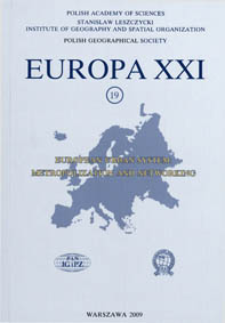- Wyszukaj w całym Repozytorium
- Piśmiennictwo i mapy
- Archeologia
- Baza Młynów
- Nauki przyrodnicze
Wyszukiwanie zaawansowane
Wyszukiwanie zaawansowane
Wyszukiwanie zaawansowane
Wyszukiwanie zaawansowane
Wyszukiwanie zaawansowane

Obiekt
Tytuł: Spatial analysis of urban network of Wrocław
Inny tytuł:
Wydawca:
Miejsce wydania:
Opis:
Typ obiektu:
Abstrakt:
The paper aims to understand the morphological transformation of the urban network of Wrocław caused by the rapid development and urban growth impacts. In an attempt to investigate the reason for morphological transformation of Wrocław urban network, the study focuses on the analysis of their spatial transformation through the comparative syntactic analysis during the historic process of growth of Wrocław. The spatial analysis based on ‘Space Syntax’ theories and techniques.
Bibliografia:
1. ARAW (2009), Driven by Knowledge, Wrocław Agglomeration Development Agency, <http://araw.pl/artykuly/6/Download/> (5, September 2009).
2. Figueiredo, L. (2005), Mindwalk: a Java based software for spatial analysis, Proceedings of the 5th Space Syntax International Symposium, Delft University of Technology, Delft.
3. Hillier, B. and Hanson, J. (1984), The social logic of space, Cambridge University Press, Cambridge.
http://dx.doi.org/10.1017/CBO9780511597237 -
4. Hillier, B., Hanson, J. and Peponis, J. (1987), The syntactic analysis of settlements, Architecture and Comportment/Architecture and Behavior, 3, 3, 217–231.
5. Hillier, B., Penn, A., Hanson, J., Grajewski, T. and Xu, J. (1993), Natural movement: or, configuration and attraction in urban pedestrian movement, Environment and Planning B, 20, 1, 29–66.
http://dx.doi.org/10.1068/b200029 -
6. Hillier, B. (1996), Space is the machine, A configurational theory of architecture, Cambridge University Press, London.
7. Jiang, B. C. and Claramunt, C. (1999), A comparison study on space syntax as a computer representation of space, 2nd International Space Syntax Symposium Proceedings, Brasilia, Brazil.
8. Jiang, B. and Claramunt, C. (2002), Integration of space syntax into GIS: New perspectives for urban morphology, Transactions in GIS, 6, 3, 295–309.
http://dx.doi.org/10.1111/1467-9671.00112 -
9. Jiang, B. C. and Klarqvist, C. (2000), An integration of space syntax into GIS for urban planning and design, International Journal of Applied Earth Observations and Geoinformation, 2, 3/4, 161–171.
http://dx.doi.org/10.1016/S0303-2434(00)85010-2 -
10. OECD (2008), Territorial Reviews. Poland, OECD Publishing, Paris.
11. Peponis, J., Hajinikolaou, E., Livieratos, C. and Fatouros, D. A. (1989), The spatial core of urban culture, Ekistics, 56, 334/335, 43–55.
12. Statistical Yearbook of Wrocław (2006), Wrocław in figures, official service of the Municipality of Wrocław, <http://www.Wroclaw.pl> (June 6, 2009).
13. Teklenburg, J. A. F., Timmermans, H. J. P. and Wagenberg, A. (1993), Space syntax: standardized integration measures and some simulations, Environment and Planning B: Planning & Design, 20, 3, 347–357.
http://dx.doi.org/10.1068/b200347 -
14. Wang, H. (2009), Space configuration and movement pattern of Chinese traditional settlement, 7th International Space Syntax Symposium Proceedings, Stockholm, Sweden.
Czasopismo/Seria/cykl:
Tom:
Strona pocz.:
Strona końc.:
Szczegółowy typ zasobu:
Format:
Rozmiar pliku 2 MB ; application/pdf
Identyfikator zasobu:
oai:rcin.org.pl:55821 ; 1429-7132 ; 10.7163/Eu21.2008.19.6
Źródło:
CBGiOŚ. IGiPZ PAN, sygn.: Cz.6406, Cz.6407 ; kliknij tutaj, żeby przejść
Język:
Prawa:
Prawa zastrzeżone - dostęp nieograniczony
Zasady wykorzystania:
Digitalizacja:
Instytut Geografii i Przestrzennego Zagospodarowania Polskiej Akademii Nauk
Lokalizacja oryginału:
Dofinansowane ze środków:
Unia Europejska. Europejski Fundusz Rozwoju Regionalnego ; Program Operacyjny Innowacyjna Gospodarka, lata 2010-2014, Priorytet 2. Infrastruktura strefy B + R
Dostęp:
Kolekcje, do których przypisany jest obiekt:
- Repozytorium Cyfrowe Instytutów Naukowych > Kolekcje Partnerów > Instytut Geografii i Przestrzennego Zagospodarowania PAN > Publikacje pracowników i Wydawnictw
- Repozytorium Cyfrowe Instytutów Naukowych > Kolekcje Partnerów > Instytut Geografii i Przestrzennego Zagospodarowania PAN > Biblioteka Instytutu > Serie/Czasopisma/Cykle
- Repozytorium Cyfrowe Instytutów Naukowych > Piśmiennictwo > Czasopisma/Artykuły
Data ostatniej modyfikacji:
25 mar 2021
Data dodania obiektu:
14 sie 2015
Liczba pobrań / odtworzeń:
1197
Wszystkie dostępne wersje tego obiektu:
https://rcin.org.pl./publication/75506
Wyświetl opis w formacie RDF:
Wyświetl opis w formacie RDFa:
Wyświetl opis w formacie OAI-PMH:
| Nazwa wydania | Data |
|---|---|
| Saeid A.. A. H., Masztalski R. - Spatial analysis of urban network of Wrocław | 25 mar 2021 |
Obiekty Podobne
Janc, Krzysztof
Niemcy. Reichsamt für Landesaufnahme. Wydawca Prusy. Landesaufnahme. Redaktor
Maleczyńska, Ewa (1900–1972)
Myśliwski, Grzegorz (1966– )

 INSTYTUT ARCHEOLOGII I ETNOLOGII POLSKIEJ AKADEMII NAUK
INSTYTUT ARCHEOLOGII I ETNOLOGII POLSKIEJ AKADEMII NAUK
 INSTYTUT BADAŃ LITERACKICH POLSKIEJ AKADEMII NAUK
INSTYTUT BADAŃ LITERACKICH POLSKIEJ AKADEMII NAUK
 INSTYTUT BADAWCZY LEŚNICTWA
INSTYTUT BADAWCZY LEŚNICTWA
 INSTYTUT BIOLOGII DOŚWIADCZALNEJ IM. MARCELEGO NENCKIEGO POLSKIEJ AKADEMII NAUK
INSTYTUT BIOLOGII DOŚWIADCZALNEJ IM. MARCELEGO NENCKIEGO POLSKIEJ AKADEMII NAUK
 INSTYTUT BIOLOGII SSAKÓW POLSKIEJ AKADEMII NAUK
INSTYTUT BIOLOGII SSAKÓW POLSKIEJ AKADEMII NAUK
 INSTYTUT CHEMII FIZYCZNEJ PAN
INSTYTUT CHEMII FIZYCZNEJ PAN
 INSTYTUT CHEMII ORGANICZNEJ PAN
INSTYTUT CHEMII ORGANICZNEJ PAN
 INSTYTUT FILOZOFII I SOCJOLOGII PAN
INSTYTUT FILOZOFII I SOCJOLOGII PAN
 INSTYTUT GEOGRAFII I PRZESTRZENNEGO ZAGOSPODAROWANIA PAN
INSTYTUT GEOGRAFII I PRZESTRZENNEGO ZAGOSPODAROWANIA PAN
 INSTYTUT HISTORII im. TADEUSZA MANTEUFFLA POLSKIEJ AKADEMII NAUK
INSTYTUT HISTORII im. TADEUSZA MANTEUFFLA POLSKIEJ AKADEMII NAUK
 INSTYTUT JĘZYKA POLSKIEGO POLSKIEJ AKADEMII NAUK
INSTYTUT JĘZYKA POLSKIEGO POLSKIEJ AKADEMII NAUK
 INSTYTUT MATEMATYCZNY PAN
INSTYTUT MATEMATYCZNY PAN
 INSTYTUT MEDYCYNY DOŚWIADCZALNEJ I KLINICZNEJ IM.MIROSŁAWA MOSSAKOWSKIEGO POLSKIEJ AKADEMII NAUK
INSTYTUT MEDYCYNY DOŚWIADCZALNEJ I KLINICZNEJ IM.MIROSŁAWA MOSSAKOWSKIEGO POLSKIEJ AKADEMII NAUK
 INSTYTUT PODSTAWOWYCH PROBLEMÓW TECHNIKI PAN
INSTYTUT PODSTAWOWYCH PROBLEMÓW TECHNIKI PAN
 INSTYTUT SLAWISTYKI PAN
INSTYTUT SLAWISTYKI PAN
 SIEĆ BADAWCZA ŁUKASIEWICZ - INSTYTUT TECHNOLOGII MATERIAŁÓW ELEKTRONICZNYCH
SIEĆ BADAWCZA ŁUKASIEWICZ - INSTYTUT TECHNOLOGII MATERIAŁÓW ELEKTRONICZNYCH
 MUZEUM I INSTYTUT ZOOLOGII POLSKIEJ AKADEMII NAUK
MUZEUM I INSTYTUT ZOOLOGII POLSKIEJ AKADEMII NAUK
 INSTYTUT BADAŃ SYSTEMOWYCH PAN
INSTYTUT BADAŃ SYSTEMOWYCH PAN
 INSTYTUT BOTANIKI IM. WŁADYSŁAWA SZAFERA POLSKIEJ AKADEMII NAUK
INSTYTUT BOTANIKI IM. WŁADYSŁAWA SZAFERA POLSKIEJ AKADEMII NAUK


































